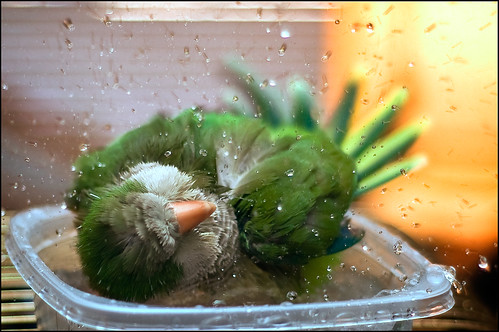 Splish Splash Photo: Bobby AcreeThe Nashua woman fighting to keep her Quaker parrots, banned from the state because of their troublesome nesting habits, was told yesterday at a meeting in Concord that she must part with her pets.
Splish Splash Photo: Bobby AcreeThe Nashua woman fighting to keep her Quaker parrots, banned from the state because of their troublesome nesting habits, was told yesterday at a meeting in Concord that she must part with her pets.
Meanwhile, the Fish and Game Department said it will help Suzanne Burke relocate her birds, softening the 30-day deadline it had imposed last month, when an official went to her house to say her birds were illegal.
Rep. Jeanine Notter of Merrimack, who attended the meeting in support of Burke, vowed to push for legislation that will repeal the Fish and Game law, on the books since 1998.
Notter said she and Rep. Kevin Avard of Nashua, also at the meeting, spoke to Speaker of the House William O'Brien after the one-hour meeting, starting the legislative process needed to make ownership of Quaker parrots legal in the state.
Notter hopes to one day testify before a House committee. "That's when it will come out that there are thousands of Quaker parrots in the state of New Hampshire, because they've been sold in pet stores," Notter said. "No one knew about this rule."
Including Burke. The 38-year-old Nashua mother of three has been breeding Quaker parrots for years, never aware that Fish and Game had banned the 12-inch-long bird because of its behavior in other states.
Quaker parrots nest in power lines, sometimes causing fires. Fish and Game took action on advice from a neighboring state 13 years ago.
"The real-life negative experiences of states such as Connecticut," Fish and Game public affairs chief Judy Stokes wrote in an e-mail, "where the (Quaker parrot) has escaped into the wild and become established have led them to strongly advise the N.H. Fish and Game Department to make every effort to prevent the establishment of a population of this bird, because of the significant problems they create."
Still, despite the law, pet stores continued to sell Quaker parrots, and people like Burke made no attempt to hide their ownership of the bird. As a breeder, Burke said she'd had contact with the state veterinarian, Dr. Stephen Crawford of the Department of Agriculture, for years.
When Burke heard from a bird club member that she owned Quaker parrots illegally, she contacted Fish and Game to learn the truth, and the organization then sent a representative to her house on Jan. 30 to investigate.
Burke was given 30 days to find homes out of state for her nearly 20 birds. Fish and Game Lt. Robert Bryant said in a recent published report that euthanasia was an option.
That led to yesterday's meeting with Fish and game officials. Burke and Notter tried to convince them to allow Burke to keep her birds.
"It's ridiculous to think these little pet birds are going to sneak out of their cages and form a colony and cause a problem," Notter said.
"I think it went well," added Burke. "There was an open dialogue with Fish and Game. At the present moment, the situation hasn't changed. I still have to re-home the birds or get them out of state, but we're willing to talk, so I guess that's a start."
Stokes was asked yesterday if the 30-day deadline had been extended.
"Our plan is to just keep working with her, and I don't imagine there will be any need to go further than that," Stokes said.
When asked if euthanasia had been taken off the table, Stokes said, "The answer is we're going to keep working with her to resolve her issue."
Burke says Fish and Game will check on her after the 30-day deadline "to see how many birds have been placed and where they're placed."
She added that finding temporary homes for the Quaker parrots and then bringing them back if Notter's law passes isn't likely.
"It's been years of trying to get good birds," Burke said. "I don't know if I'm up to the task of putting it together again. It takes a lot of time to acquire a good collection. I have to part with them, and I don't know If I'm going to start from scratch again."